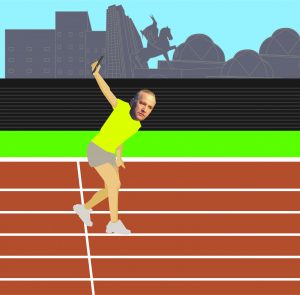Meet the eight mayoral candidates who have promised to solve Prishtina’s many problems, from air pollution to wastewater management.
On October 22, 2017, polls will open for Kosovo’s local elections, during which 38 municipalities will choose their mayors and municipal assembly members. There are a total of eight candidates running for mayor of Prishtina, the country’s capital and biggest city. Each one of them claims to have solutions to the city’s many problems — ranging from traffic congestion to air pollution, dealing with illegal buildings, accessible healthcare, better school conditions, fighting nepotism, streamlining the administration, more parks and green spaces, and decreasing noise pollution from cafes and bars too close to residential areas, all the while also ensuring a pro-business atmosphere.
The entrepreneur turned social media strategist

Illustration: Trembelat
Selim Pacolli, the director of Swiss Diamond Hotel, runs under the flag of New Kosovo Alliance, AKR. He has a background in economics and previously held a number of top echelon positions at various domestic and international companies.
He started his (pre)electoral campaign with a series of sponsored video selfies on Facebook and Instagram asking people to contact him on his viber number. “Send me a text, photo, or a video with questions, suggestions, or concerns you might have,” said Pacolli on one of his early videos shot at Prishtina’s Skenderbeg Square.
Besides receiving legitimate concerns from the citizens, with the internet being an unforgiving place, the jokes started pouring in and social media filled with screenshots of humorous citizen requests. Yet Pacolli stuck to his guns when he invited all of his competition to join him in celebration of his birthday, which coincided with the start of the campaign. None showed up.
Pacolli also did his fair share of door-to-door campaigning and live handshaking. Nonetheless, it is a promise posted on his official facebook page that best delineates his priorities: to move governmental institutions out of Prishtina, as well as decrease the number of cars by 20 thousand, in order to declutter the city and return it to the people.
Pacolli’s viber number is now posted right next to his face on giant billboards around Prishtina. His social media team was definitely worth its money. There is no such thing as bad press, and if tweeting got Trump elected, why not take this internet thing to the next level.
The quantum accountant

Illustration: Trembelat
Shyqiri Bytyqi is the candidate from the Initiative for Kosovo, NISMA, although he just got the difficult job of being Minister of Education, Science, and Technology within the Ramush Haradinaj government. He is an economist and a certified accountant and auditor. He was a consultant for the World Bank and the American Chamber of Commerce in Kosovo, and he claims to be one of the founders of Kosovo’s Tax Administration.
Recently, in his role as the Minister of Education, under Prime Minister Haradinaj’s official request, Bytyqi discharged the entire board of the Kosovo Accreditation Agency and its acting director, which was received with criticism from civil society.
Even though quantum physics theoretically allows for matter to be in two places at once, we doubt that the science and technology divisions of the ministry Bytyqi heads have managed to come up with a working prototype of a machine that makes it possible for for Bytyqi to both be Minister and campaign for mayor. That being said, it seems that Bytyqi’s new job prevented him from actively campaigning compared to his running mates. Based on his limited media appearances so far, his main focus seems to be on culture.
The environmentalist

Illustration: Trembelat
Rifat Deri runs under the ticket of upstart political party Alternativa. He has a background in economics and accounting, and runs a private business. His greatest priority is environmental protection. He proposes a three-pronged approach for cleaning up Prishtina: air, water, and trash. He mentions an urgent need to limit pollutants from transportation, heating, burning of waste, and uncontrolled discharge of gases from Kosovo’s coal-fired power plants.
He proposes the building of a new, 30 to 40 hectare landfill which would also cooperate with recycling companies to treat 75 per cent of Prishtina’s waste, which, according to Deri, is recyclable. He stressed the need for the construction of a treatment plant for waste water through donations, since Kosovo is the only capital in the region that lacks one.
In his calls for tactical urbanisation, Deri proposes a solution for traffic congestion in the form of an ‘inner ring’ for Prishtina, by changing certain streets to face one-way, within his first month in office. This would cut travel time by approximately three times.
The citizen-farmer

Illustration: Trembelat
Avni Cakmaku — who holds a masters degree in sociology, and considers himself “a doctor of the society, able to both diagnose and prescribe therapies for various socio-economic conditions” — is running under the ticket of Fjala, the Word, the upstart religious conservative political party, newly splintered from the Justice Party.
Cakmaku’s greatest priority for Prishtina is economic development through agriculture, animal husbandry, and orcharding. Cakmaku claims that this plan would extend the production season to the full 12 months of the year and would benefit the areas surrounding Prishtina such as Barileva, Prugovc, Bernice, Besi, Bardhosh, Shkabaj, and the region of Gollak. This would be achieved through greenhouse subsidies, a project to redirect warm water from power plants to be used for irrigation during winter, as well as the construction of a factory to treat wastewater so as to keep the fertile lands uncontaminated.
“In the second phase, we will start the industrialization of these activities by investing in the food processing industry,” said Cakmaku to Prishtina Insight via email. According to Cakmaku, Prishtina’s property taxes are ten times those of neighboring Tirana, and he calls for their re-examination.
The incumbent dethroner

Illustration: Trembelat
Shpend Ahmeti is the current mayor of Prishtina, running for re-election as a part of Vetevendosje, the Self-determination party. Four years ago, in a runoff election, he dethroned Isa Mustafa, the head of LDK. In this way he broke the LDK’s long-held stronghold of Prishtina.
Over the past four years, the current administration worked on stopping the illegal constructions in the city, providing free breakfast for schoolchildren, increasing city data transparency, revamping the administration to run more efficiently — you can now get official documents on ATM-like machines — and bringing a fleet of new busses to the public transportation system.
He is critiqued by his rivals for taking credit for projects — such as bringing 24 hour water, or completion of the construction of several wide streets — that had begun during previous administrations and have come to completion during his mandate. He has also been accused of suffocating the construction business with the implementation of his urbanism policies.
Ahmeti started his politicking as a student senator and later as the head of student government at American University in Bulgaria. He then continued his education at Harvard’s Kennedy School of Government. But then again, there are some things only the streets of Prishtina, and walking in the shoes of its mayor, can teach you. One of them being that it is very difficult to get things done if you don’t have the necessary votes in the Municipal Assembly.
And so, during his speech that opened his electoral campaign, he appealed to his supporters about this issue. “I am not only asking for your vote for [me as] mayor but also for the other members of the Municipal Assembly.”
For his next mandate, Ahmeti swore to a list of ten promises and a hundred commitments. It remains to be seen if they prove sufficient to secure him another term, or if one of his rivals will be the one to dethrone the dethroner.
The League's anointment

Illustration: Trembelat
The University of Sussex-educated Arban Abrashi runs under the ticket of the Democratic League of Kosovo, LDK. The 38 year old is currently an MP and was Minister of Labor and Social Welfare in the Mustafa Government.
From the depths of LDK’s organizational branches and sub-branches, amidst consultations and discussions, voices were united in support of Abrashi’s candidacy. Chosen for his, as Abrashi noted in an interview with Rrokum TV, “ability to get things done” as well his “likability by the people,” the party leadership saw him as the anointed one to redeem LDK and help it reclaim the city that it considers rightfully its own.
“I’ll change the very approach towards Prishtina,” said Abrashi during his campaign. “We believe that a different approach to development is needed. We have recorded that Prishtina needs great investments in infrastructure, which we have designed and planned. It needs interventions in many sectors, such as environmental issues, education, healthcare, and culture.”
The voice

Illustration: Trembelat
Arber Vllahiu, a former advisor to former President Jahjaga, and a former journalist with BBC, Deutsche Welle, and Radio Free Europe, runs under the ticket of Alliance for the Future of Kosovo, AAK. Currently he is the Haradinaj government’s spokesperson.
Being the voice of the government comes with some perks in terms of experience. You may know what kind of language best works with the voters. Vllahiu chose to appeal to the citizen’s sense of besa, the Albanian precept of the given word.
“The change will come with people who never broke their oaths,” said Vllahiu during an election rally. “Others promised you many things. Lately they even gave you a hundred new promises for the years to follow. We won’t promise, but will give solutions for each problem.”
It remains to be seen how the ‘voice of unbroken vows’ will deal with “the unfortunate fact that even after eighteen years, the citizens of Prishtina continue to face difficulties in infrastructure, roads, lack of waterworks and waste disposal, lack of streetlights, ever-present trash, and lack of greenery,” as Vllahiu recounted during his campaign speech.
The breaker of the fourth wall

Illustration: Trembelat
Lirak Celaj comes from the ranks of Democratic Party of Kosovo, PDK. He was a former MP, former Deputy Minister of Justice in the Mustafa government, and former director of the National Theatre of Kosovo. During the current Prishtina administration, he was a member of the Prishtina Assembly, a vocal opposition and filibuster of Ahmeti’s proposals.
We can only speculate if Celaj’s extensive, post-war political experience will be more beneficial, or if his actions will be inspired by his art. If politics is a stage, than Celaj’s professional training as an actor sure comes in handy, not only in the presentation, but also in content. Will he materialize lessons from Shakespeare’s Richard III, you know, the predecessor to House of Cards? Or perhaps he’s more of a Coriolanus, considering Celaj was part of Kosovo Liberation Army? Or a Mark Antony from Julius Caesar, asking friends, voters, and countrymen to lend him their ears and recognize the boon that PDK’s reign brought them?
“I will turn Prishtina into a city of festivals,” Celaj said during his campaign. He further plans to turn Prishtina into the capital of information technology, and turn the Gollak area into an “Eco-Zone.” And all this while solving the congested traffic by imposing a tax for cars entering Prishtina and improving public transportation.
Then again, it remains to be seen, with their many promises, if all eight of the candidates are more akin to the wizard Prospero from Shakespeare’s the Tempest.





